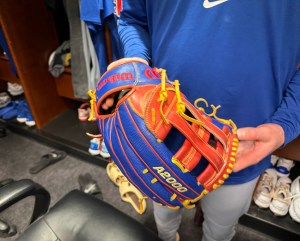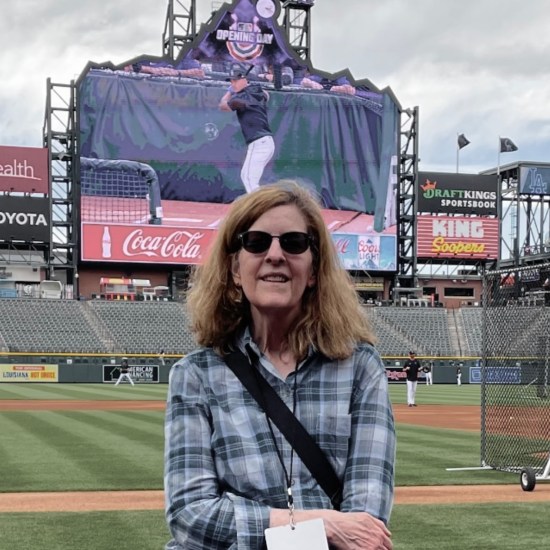Pitcher List Conversations are transcripts of interviews with professional baseball players — and sometimes, players discuss topics other than baseball. This has been lightly edited for clarity.
★ ★ ★
It’s been a remarkable season for Chicago Cubs center fielder Pete Crow-Armstrong.
Last year, the rookie played 13 games with the Cubs; in 2024, he spent only 26 games in Triple-A before being promoted. Since then, he’s slashed .239/.289/.396 with 10 home runs and 27 stolen bases.
More notable has been his defense. Crow-Armstrong has 12 DRS in 929.2 innings. His Fielding Range Value is an impressive 15 while he has 14 Outs Above Average. In short, he is putting together a Gold Glove season in his rookie campaign.
When the Cubs visited Coors Field on September 13-15, it marked Crow-Armstrong’s return to his MLB debut park — and he had a solid game, including an outstanding catch as well as his first home run.
During his time in Denver, I asked Crow-Armstrong about being back at Coors, his training strategy, and the details of his glove.
★ ★ ★
Renee Dechert: You’re back at Coors Field where you made your debut last year. What is it like to be back?
Pete Crow-Armstrong: It’s cool. It’s a fun outfield to play in. I’m lucky to be playing baseball a year later and with the relatively similar group of guys that I really like.
RD: What advice would the PCA that’s standing here now give to the PCA from a year ago?
PCA: Relax. For the most part, it’s the same game. The stuff that you needed to get better at was going happen over time. Just be a little patient.
RD: You’re known for being an aggressive outfielder. What does that mean?
PCA: I don’t know. I don’t know if I view myself as an aggressive outfielder. I just try and make the play. I think as a center fielder, your job is to go catch every ball.
RD: What do you do in the outfield between plays to stay engaged?
PCA: I usually try and take care of the thinking part of it all before each batter.
I mean, you kind of know the situation just by looking at the field and knowing the outs and everything. So that kind of takes care of itself.
But obviously, if the situation changes, I’m thinking about how to — I guess I’m thinking ahead a little bit. But otherwise, in between pitches, I try and tune out a little bit and check out because you’ve got to lock in a few seconds later. So just taking my little bit of time to kind of check out. Being quiet is kind of how I stay locked in.
RD: That’s what Charlie Blackmon told me. Blackmon says when he’s really good, he’s just in the zone, and he’s not really hearing anything.
Do you interact with fans?
PCA: Absolutely, yeah. I kind of love that. I think games can start to feel long sometimes — you may not be getting all that much action in the outfield. And I think fans are a good part of the game. And I like the intensity they bring in their own right.
And I like giving it back to them.
I feel like it’s all fair game, and it’s all fun and games, too, unless it gets nasty, and then if it gets nasty, I think it’s my job to be the baseball player and just play the game.
RD: How do you how do you prepare defensively?
PCA: Making sure I get my reads, if necessary. At this point in year, there’s days I won’t go out for BP or anything like that. It’s Game 100 and whatever. You’ve already seen enough to be ready. But in an outfield like this, I kind of know how to play balls just based on how it flies, and I have all my little prior information ready to go, and I just take care of my body otherwise.
RD: You’re in the Gold Glove conversation. What does that feel like?
PCA: Feels good. You know, that’s part of the reason I’m here, and it’s one of the things that I’m definitely shooting for every year, but I think there’s a ways to go with all that. If it happens, it happens. If not, I’ll have a Gold Glover next to me, and hopefully two up the middle.
RD: What’s your favorite catch you’ve made this year?
PCA: This year, it’s got to be the game-winner.
RD: Can you describe it?
PCA: I think it was a relatively easy ball to follow. It had a lot of hang time, so I just had enough time to get back to the wall, and it fell in the right spot, really.
RD: You struggled a little bit at the plate in the first half. That seems to have evened out for you in the second half. What kinds of adjustments did you make?
PCA: A lot. I mean, I don’t think there was just one that really kind of turned the tables for me or turned the tide, but just kind of digging in and taking everything on the chin.
Willie Harris [the Cubs third base coach] always likes to remind us that you’re gonna strike out, you’re gonna pop out. Shit happens. So what are you afraid of, really?
That’s kind of the mindset I’m taking. If I’m chasing the back-foot sliders a bunch in the first half, then don’t be afraid to swing and miss at that one. And I think at the same time, don’t be afraid to go down looking, and, in turn, that kind of gives you a better feel of how that pitch doesn’t work for you, and why that’s a pitcher’s pitch and why that pitch gets you out.
Just taking information as you go. I think I’ve done a good job of paying attention to my at-bats this year and using them to my advantage.
RD: Last one. I wondered if you could show me your glove and talk a bit about your glove and your relationship to it.
PCA: It’s just a glove [laughs]. I don’t know.

RD: How’d you get it? What do you like about it?
PCA: It’s the same glove I’ve used for the last three years — the same model, I’ve used for the last three years. Yeah, I just feel comfortable with it.

